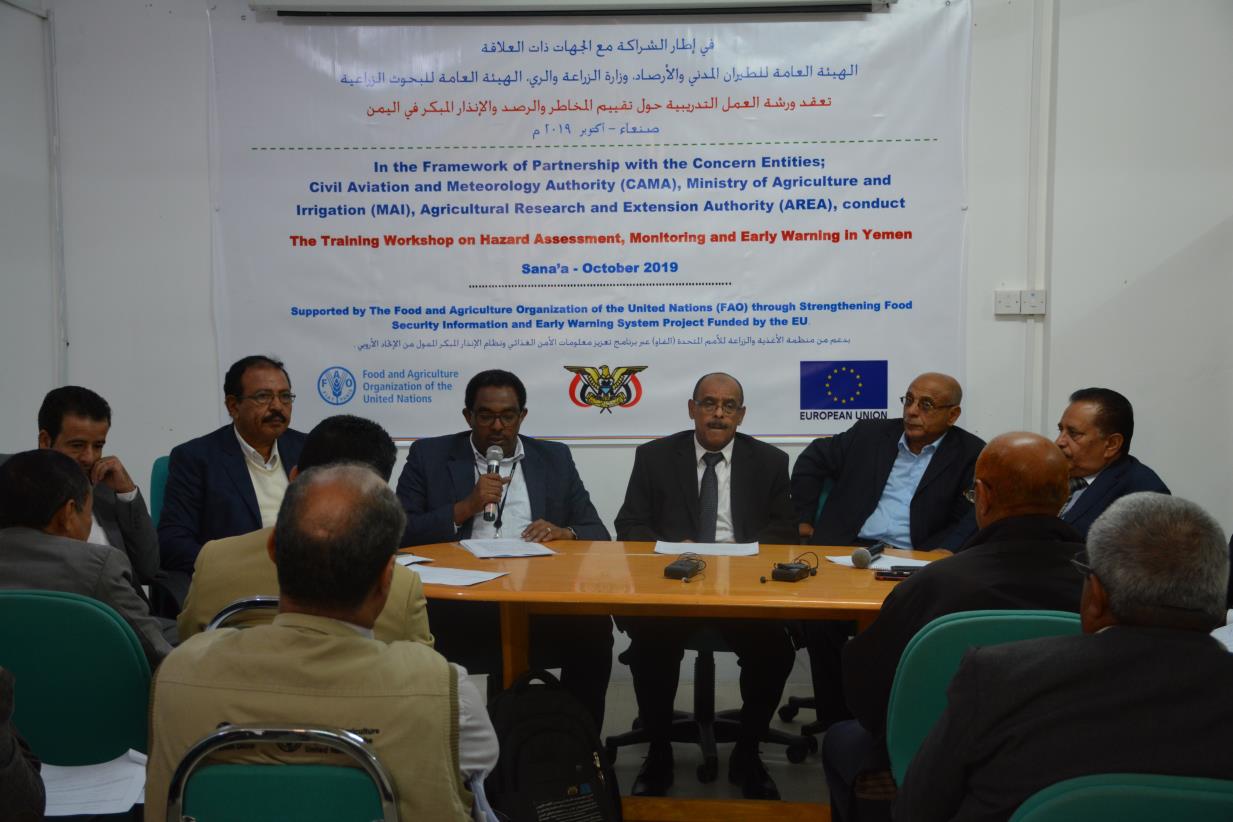Funded by EU, FAO Qualifies National Cadres on Hazards Assessment, Monitoring and Early Warning in Yemen

©FAO - A total of 160 trainees were trained in previous phases related of weather and climate - focused data/information within the European Union (EU) funded FAO’s Enhancement of Food Security and Resilient Livelihoods program.
26 November 2019 Sana'a / Yemen - The Food and Agriculture Organization of the United Nations (FAO) with fund from European Union supported national cadres' capacity building towards early warning systems enhancement in Yemen. The eight-day training program included the topics hazards assessment, monitoring and natural disaster early warning when 52 participants took part representing 15 government ministries, research institutions and civil society organizations involved in Disaster Risk Reduction (DRR) in terms of early warning data/information generation, processing, sharing and reporting to respective targets.
A total of 160 trainees were trained in previous phases related of weather and climate - focused data/information within the European Union (EU) funded FAO's Enhancement of Food Security and Resilient Livelihoods program.
The training program aims at building the technical and institutional capacity towards Disaster Risk Reduction (DRR) in the country through strengthening the capacity of key technical staff on utilization of geospatial technologies as well as providing a platform for technical experts to discuss the existing methods and tools for effective hazard assessment, monitoring and early warning.
FAO has worked to establish a technical dialogue between government institutions working in early warning and questionnaires distribution which lead to know available capacities in each side and the need for data and information as well as targets identification of the early warning and messaging mechanism using necessary methods and timing, and the response to the early warning system at all levels.
In the inauguration of the early warning program, Hussein Gadain, FAO Representative to Yemen said, "Yemen is in crucial need for capacity building particularly on use of modern technologies that will enable timely monitoring and forecasting of hazards."
"FAO in strong partnership with the EU will equip technical institutions with necessary capacities in order to take necessary measures in advance to avoid the possible destructive consequences of any climate change related hazards that may occur," Gadain added.
Early Warning for Early Response
FAO through Strengthening Food Security Information and Early Warning Systems Project has launched an initiative to establish an Early Warning System in collaboration with government authorities. The programme has invested heavily to boost its monitoring network through rehabilitation of 41 weather stations and installation of 8 new Automatic weather stations (AWS) and one marine station in selected locations throughout the country to ensure availability of near real time data in support of early warning for early action.
The project aims at Improving Food Security and Nutrition Governance for decision making at national and Governorate levels, and future plans include systematization and expansion of the scope of the current Early Warning System to include food and nutrition security to ensure generation of holistic information utilizing socio—economic factors.
The exerted efforts by FAO and partners aims to improve Yemen's ability to monitor emerging threats to food security and livelihoods such as poor weather, crop pests and diseases, soaring prices of agriculture inputs, so that appropriate livelihood support, for example; irrigation services, treatment/vaccination and feed for livestock, can be provided before negative effects develop.
